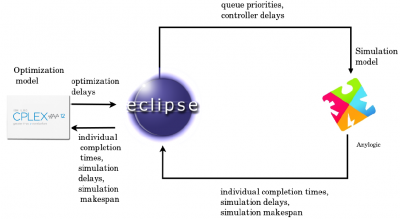
System dynamics methodology, discrete-event simulation, and agent based models are powerful techniques to model, understand and analyse complex stochastic and dynamic systems. Hybrid methods that combine simulation with optimisation approaches assist evidence-based robust policy decisions. The applications range across supply chain, transportation, socio-economic and healthcare systems.
Our current research activities are described below:
■ Hybrid frameworks for combining simulation and optimisation have been developed and demonstrated for job shop scheduling problems. In this, the complete operational characteristics are captured in discrete-event simulation models which is interfaced with an optimum seeking package that encapsulates a minimalistic (novel) optimisation model.
■ Output analysis under input data uncertainty The input data distribution for any simulation model is derived from sample data from real system. The uncertainty in the input data affects the simulation performance and subsequent decisions. Also, the models themselves (especially socio-economic models) add an element of uncertainty. Further, simulation-based optimisation / decision making approaches have inherent stochastic uncertainty due to which there is a possibility of missing the best solution. To tackle these problems, we are working on algorithmic procedures for finding the best solution or decision by explicitly accounting for these uncertainties based on kriging and response surface methodology.
■ Real-time traffic signal controller scheme Signalised intersections play a critical role in urban road transportation systems to reduce congestion. Sub-optimal and non-adaptive signal timings lead to significant congestion resulting in delay, driver frustration, pollution and fuel wastage. An optimisation model that minimises the total average control delay and finds the optimal green times without explicit demand prediction for heterogeneous non-lane following road traffic has been designed and tested. Real-time adaptive signaling framework for a single intersection as well as a coordination approach for corridors has been developed.
Prof. J Venkateswaran
